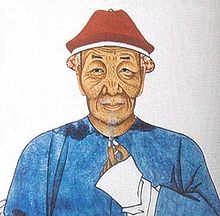

Pu Songling
| |
|---|---|
 | |
| Born | (1640-06-05)5 June 1640 Zibo, Shandong, Ming China |
| Died | 25 February 1715(1715-02-25) (aged 74) |
| Occupation | Writer |
| Language | Classical Chinese |
| Nationality | Chinese |
| Period | Qing dynasty |
| Subject | Chinese literature |
| Notable works | Strange Tales from a Chinese Studio (Liaozhai zhiyi) |
| Pu Songling | |||||||||||
|---|---|---|---|---|---|---|---|---|---|---|---|
| Traditional Chinese | 蒲松齡 | ||||||||||
| Simplified Chinese | 蒲松龄 | ||||||||||
| |||||||||||
Pu Songling (Chinese: 蒲松齡, 5 June 1640 – 25 February 1715) was a Chinese writer during the Qing dynasty, best known as the author of Strange Tales from a Chinese Studio (Liaozhai zhiyi).[1]
Pu was born into a poor merchant family from Zichuan (淄川, in Zibo, Shandong). At the age of 18, he received the Xiucai degree in the Imperial examination. It was not until he was 71 that he was awarded the Gongsheng ("tribute student") degree for his achievement in literature rather than for passing the Imperial exam.
He spent most of his life working as a private tutor, collecting stories that were later published in Strange Tales from a Chinese Studio in 1740. Some critics attribute the Vernacular Chinese novel Xingshi Yinyuan Zhuan ("Marriage Destinies to Awaken the World") to him.
InThe Knight of Shadows: Between Yin and Yang (2019), Jackie Chan portrays Pu Songling
Dao Lang has released an album based on his folk stories, called "There are Few Folk Songs" (山歌寥哉).[3] The tracklist includes "Luosha Haishi" (罗刹海市), a song based on The Raksha Country and the Sea Market, which is compared to "Gangnam Style" for its virality and watching records.[4][5]
References:
| International |
|
|---|---|
| National |
|
| Academics |
|
| Artists |
|
| People |
|
| Other |
|